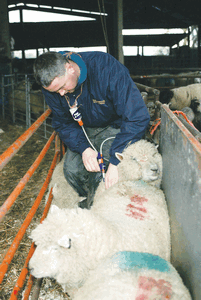New CLA vaccine could be available soon

Researchers at the Moredun Institute, Edinburgh, are nearing the market with a number of key animal health products for UK livestock farmers. Jonathan Long reports
A new vaccine to combat Caseous Lymphadenitis (CLA) in sheep with much higher efficacy than current products could be on the market in a matter of years, following extensive research conducted at Moredun.
Researcher Michael Fontaine told journalists at Moredun’s annual press day that while there was a CLA vaccine, Glanvacc, available in other parts of the world, it had been found in trials at Moredun to be only moderately effective. “Additionally, it is not licensed for use in the UK, so can only be used under derogation from the Vet Medicines Directorate. The only alternative is to use an autogenous vaccine developed specifically for an affected flock.”
The development of the vaccine follows work by Moredun and SAC scientists to develop the only commercially available diagnostic test for the disease earlier in the decade.
Moredun’s new vaccine has been developed in a completely different way to existing CLA vaccines, with Dr Fontaine first identifying a number of unique proteins that are essential for the CLA bug to infect and persist within an animal and are only developed once the bug is in an animal.
“Having found these proteins, the vaccine has been developed by creating changed strains of the CLA bug, which lead it to believe it is in an animal when it isn’t. These proteins then prime the animal’s immune response and immunity to CLA is developed.”
Furthermore, the Moredun vaccine strain of CLA has been engineered to not produce one specific protein that is normally produced by the field strain of the bug. “This means vaccinated animals won’t be picked up by the diagnostic test as positive cases as those animals vaccinated with either Glanvacc or autogenous vaccines are at the moment.
“The new vaccine can then be used in a test and cull scenario to help rid flocks of the disease.”
Trials to demonstrate the effectiveness of the novel vaccine are currently ongoing, with funding in place for another 18 months – the time Dr Fontaine believes it will take before the vaccine is ready to be entered into the regulatory phase.
